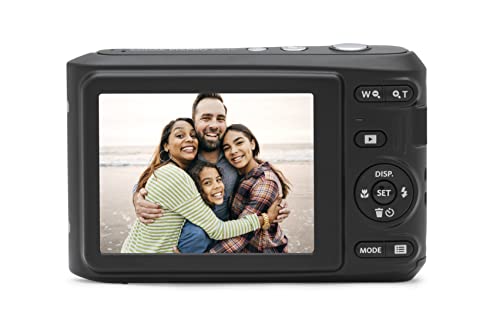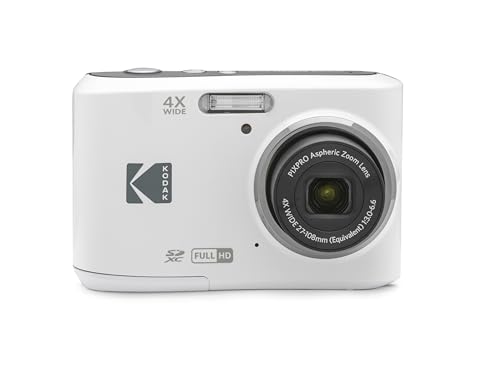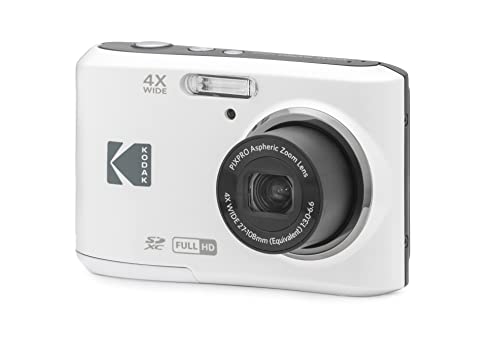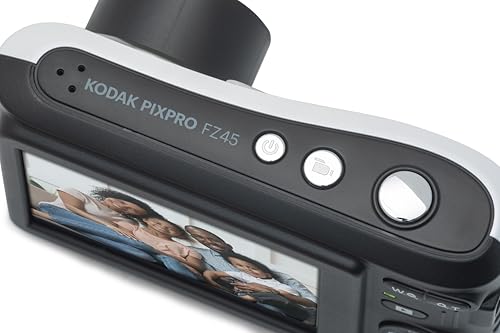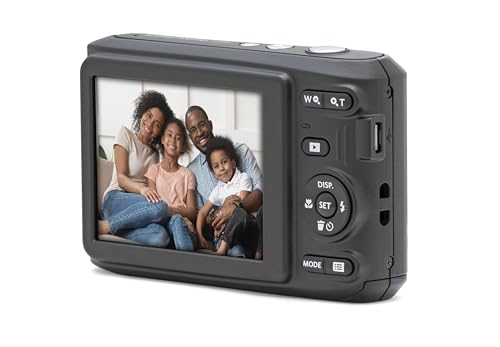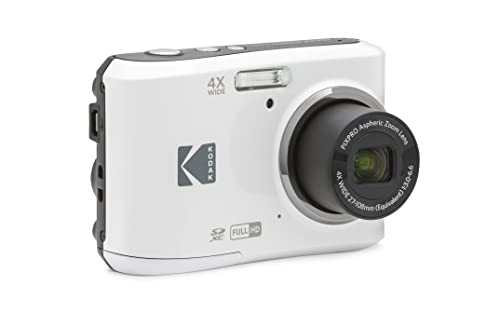




As a professional photographer, I am often asked about the best non reflex digital camera on the market. With so many options available, it can be overwhelming to choose the right one. However, after years of experience and countless hours of research, I have found the perfect camera that meets all my needs and exceeds my expectations.
The best non reflex digital camera I have come across is the Sony RX100 VII. This compact camera is packed with advanced features that deliver professional-quality images. It boasts a 20.1-megapixel 1-inch Exmor RS CMOS sensor, which allows for stunning image quality, even in low light conditions. The camera also has a fast autofocus system that ensures sharp and precise focus, perfect for capturing fast-moving subjects.
One of the standout features of the Sony RX100 VII is its impressive zoom capabilities. The camera is equipped with a 24-200mm f/2.8-4.5 lens, allowing for a wide range of focal lengths. This makes it ideal for a variety of photography genres, including landscape, portrait, and even wildlife photography. The zoom lens also features Optical SteadyShot image stabilization, which minimizes camera shake and allows for handheld shooting even at longer focal lengths.
The Rise of Non-Reflex Digital Cameras: A Revolution in Photography
In recent years, there has been a significant rise in the popularity of non-reflex digital cameras, marking a revolution in photography. These cameras have become a game-changer for both amateur and professional photographers, offering numerous advantages over their reflex counterparts.
Non-reflex digital cameras, also known as compact cameras, are smaller and more lightweight compared to the bulky and complex reflex cameras. This makes them highly portable and convenient to carry around, allowing photographers to capture spontaneous moments without the burden of heavy equipment. Additionally, their compact size makes them more suitable for travel photography and street photography, where mobility is key.
Improved technology has also played a crucial role in the rise of non-reflex digital cameras. These cameras now come equipped with advanced features and functionalities, such as high-resolution sensors, image stabilization, and face detection. These advancements have made it easier for photographers to capture high-quality images with crisp details and vibrant colors. Furthermore, the user-friendly interfaces and intuitive controls of non-reflex digital cameras have made them more accessible to beginners, enabling them to explore and express their creativity through photography.
Non-reflex digital cameras have also revolutionized the way photographs are shared and stored. With the integration of Wi-Fi and Bluetooth connectivity, it has become effortless to transfer images from the camera to other devices, such as smartphones and tablets. This enables photographers to edit and share their photos instantaneously, expanding their reach and allowing them to connect with a wider audience through social media platforms. Moreover, the ability to store a large number of images on memory cards eliminates the need for physical film, offering convenience and cost-effectiveness in the long run.
In conclusion, the rise of non-reflex digital cameras has brought about a revolution in the world of photography. Their compact size, improved technology, and seamless connectivity have made them a preferred choice among photographers of all levels. With their convenience and versatility, these cameras have opened up new possibilities and allowed photographers to capture and share their unique perspectives with the world.
Exploring the Pros and Cons of Non-Reflex Cameras
As an avid photographer, I have had the opportunity to work with various types of cameras, including both reflex and non-reflex models. While reflex cameras are often considered the top choice for professional photographers, non-reflex cameras also have their own set of advantages and disadvantages. In this article, I will explore the pros and cons of non-reflex cameras from my personal experience.
Pros:
- Compact and Lightweight: One of the major advantages of non-reflex cameras is their compact size and lightweight design. They are much smaller and easier to carry around compared to reflex cameras, making them ideal for travel photography or for photographers who prefer a more portable option.
- Silent Operation: Non-reflex cameras operate silently, which can be advantageous in certain situations, such as shooting during a theater performance or capturing wildlife without disturbing the animals. This feature allows photographers to work discreetly and avoid unwanted noise.
- Cost-effective: Non-reflex cameras tend to be more affordable compared to reflex cameras. They offer a good balance between price and functionality, making them a suitable choice for beginners or photographers on a budget.
Cons:
- No Optical Viewfinder: Unlike reflex cameras, non-reflex cameras do not have an optical viewfinder. Instead, they rely on electronic viewfinders or LCD screens for composing and framing shots. While this may not be a deal-breaker for some, photographers who prefer the traditional optical viewfinder may find it less satisfying.
- Slower Autofocus: Non-reflex cameras generally have slower autofocus systems compared to reflex cameras. This can be a limitation when photographing fast-moving subjects or in situations where quick and accurate focusing is critical.
- Limited Lens Interchangeability: Non-reflex cameras often have a fixed lens or limited options for lens interchangeability. This may restrict the range of focal lengths and creative possibilities available to photographers. However, some non-reflex cameras do offer interchangeable lens systems, although they may be less extensive than those available for reflex cameras.
In conclusion, non-reflex cameras have their own set of advantages and disadvantages. Their compact size, silent operation, and cost-effectiveness make them a great choice for photographers on the go or those on a budget. However, they may not offer the same level of versatility and performance as reflex cameras, particularly in terms of optical viewfinders, autofocus speed, and lens interchangeability. Ultimately, the choice between reflex and non-reflex cameras depends on the individual photographer’s preferences, shooting style, and specific needs.
Choosing the Best Non-Reflex Digital Camera for Your Photography Needs
As a seasoned photographer, finding the best non-reflex digital camera is essential to capturing stunning images. With the wide range of options available on the market today, it can be overwhelming to choose the right one. However, by considering a few key factors and understanding your specific photography needs, you can make an informed decision that will enhance your photographic journey.
Image quality: When selecting a non-reflex digital camera, one of the most important factors to consider is the image quality it produces. Look for a camera with a high number of megapixels, as this will ensure that your photos are sharp and detailed. Additionally, pay attention to the type of image sensor the camera uses, as this will also have an impact on image quality.
Size and weight: Another important consideration when choosing a non-reflex digital camera is its size and weight. If you plan to take your camera on-the-go or travel frequently with it, a compact and lightweight option may be more suitable. On the other hand, if you prioritize functionality and advanced features, a larger camera may be a better fit for you.
- Key features:
- When evaluating different non-reflex digital cameras, it’s important to consider the key features they offer. Look for cameras that have manual control options, as this will allow you to have more creative control over your photos. Additionally, consider features such as image stabilization, burst mode, and autofocus capabilities, as these can greatly enhance your photography experience.
- Price:
- Finally, consider your budget when choosing a non-reflex digital camera. While it’s tempting to opt for the most expensive option, it’s important to select a camera that aligns with your needs and offers a good value for money. There are many excellent options available at various price points, so be sure to do your research and compare different models before making a decision.
By considering factors such as image quality, size and weight, key features, and price, you can confidently choose the best non-reflex digital camera for your unique photography needs. Remember to prioritize your own preferences and shooting style, as this will ultimately lead to a camera that feels like an extension of yourself and helps you capture the images you envision.
The Top Features to Consider When Selecting a Non-Reflex Camera
As a photography enthusiast, I have spent countless hours researching and testing various non-reflex cameras to find the best ones on the market. Through my experience, I have discovered several key features that are crucial when selecting a non-reflex camera. These features can greatly enhance your photography experience and help you capture stunning images.
1. Image Quality: One of the most important factors to consider is the camera’s image quality. Look for a camera that has a high resolution sensor and advanced image processing capabilities. This will ensure that your photos have sharp details, vibrant colors, and minimal noise, even in low light conditions.
2. Lens Options: Another important feature to consider is the availability of interchangeable lenses. A camera with a wide range of lens options allows you to adapt to different shooting scenarios and achieve various creative effects. Look for a camera system that offers a diverse selection of lenses, including wide-angle, telephoto, and macro options.
3. Manual Control: To truly unleash your creativity, it is essential to have full manual control over your camera settings. Look for a non-reflex camera that offers manual exposure controls, adjustable shutter speed, aperture, and ISO settings. This will give you the flexibility to adjust your settings based on your desired artistic vision.
4. Ergonomics: A non-reflex camera should feel comfortable and intuitive to use. Look for a camera that has a well-designed grip, easy-to-reach controls, and a user-friendly interface. This will allow you to focus on your photography without struggling with the camera’s ergonomics.
5. Connectivity Features: In today’s digital age, connectivity features are a must-have for any camera. Look for a non-reflex camera that offers Wi-Fi or Bluetooth capabilities, allowing you to easily transfer and share your photos wirelessly. Additionally, some cameras also offer remote control functionality, which can be a handy feature for self-portraits or group shots.
In conclusion, when selecting a non-reflex camera, it is essential to consider features such as image quality, lens options, manual control, ergonomics, and connectivity. By carefully evaluating these features, you can find a camera that suits your specific needs and empowers you to take your photography to the next level.
Capturing the World in Stunning Detail: Non-Reflex Cameras and High Resolution
When it comes to capturing the world around us, nothing beats the ability to capture stunning detail. Non-reflex cameras with high resolution capabilities offer just that. With their advanced technology and impressive image quality, non-reflex cameras allow photographers to capture every intricate detail of their subjects, from the smallest dewdrop on a flower petal to the fine lines on a person’s face.
One of the key advantages of non-reflex cameras is their high resolution. These cameras are equipped with sensors that can capture images with remarkable clarity and sharpness. With a high-resolution non-reflex camera, you can zoom in and examine the smallest details of an image without worrying about losing any quality. This makes them ideal for photography genres such as macro, portrait, and landscape, where capturing fine details is crucial.
Macro photography: Non-reflex cameras excel in macro photography, where capturing intricate details is the ultimate goal. Whether you are photographing a tiny insect or a delicate flower, a non-reflex camera with high resolution will allow you to capture the fine textures and patterns with utmost precision.
Portrait photography: When it comes to capturing the subtle nuances of a person’s face, non-reflex cameras are the way to go. With their high-resolution sensors, these cameras can capture the tiniest details in a portrait, such as the sparkle in the eyes or the texture of the skin. This ensures that every portrait you take is full of lifelike details that truly capture the essence of the subject.
Landscape photography: Non-reflex cameras are also a great choice for landscape photography. With their high resolution, these cameras can capture the intricate details of a sweeping landscape, from the texture of rocks to the individual leaves on a tree. The result is breathtaking images that transport viewers to the very scene you captured.
In conclusion, non-reflex cameras with high resolution capabilities are a must-have for photographers who want to capture the world in stunning detail. Whether you are interested in macro, portrait, or landscape photography, these cameras offer the ability to capture even the smallest details with incredible clarity and sharpness. So, if you want to take your photography to the next level and truly capture the essence of your subjects, consider investing in a non-reflex camera with high resolution capabilities.
Understanding the Importance of Megapixels in Non-Reflex Cameras
In the world of non-reflex digital cameras, one term that frequently comes up is “megapixels”. You may have heard this word thrown around in discussions about camera resolution, but what exactly does it mean, and why is it important? Let’s dive into the world of megapixels and discover their significance in non-reflex cameras.
Megapixels, simply put, refer to the number of pixels in an image captured by the camera’s sensor. Each individual pixel represents a tiny dot of color, and the more pixels a camera can capture, the higher the resolution of the resulting image. In other words, the more megapixels a camera has, the more detail and clarity you can expect to see in your photos.
The importance of megapixels in non-reflex cameras lies in the ability to capture and reproduce images with precision and sharpness. With higher megapixel counts, you can capture intricate details, vibrant colors, and sharp lines, making your photos appear more lifelike and realistic. Additionally, having a higher megapixel count gives you more flexibility when it comes to cropping or enlarging your photos without compromising on image quality.
It is important to note, however, that more megapixels does not always equate to better image quality. While a higher megapixel count can result in more detail, it also means that each individual pixel is smaller. This can lead to increased image noise and reduced low-light performance. Ultimately, the right balance of megapixels depends on your specific needs and the type of photography you plan to pursue with your non-reflex camera.
In conclusion, understanding the importance of megapixels in non-reflex cameras allows you to make informed decisions when choosing the right camera for your needs. While higher megapixel counts generally offer greater detail and flexibility, it is essential to consider other factors, such as sensor size, image processing capabilities, and lens quality, to ensure optimal image quality in all shooting scenarios.
Mastering the Art of Composition: How Non-Reflex Cameras Enhance Your Creative Vision
As a passionate photographer, I have always been fascinated by the art of composition. For me, it is not just about capturing a moment, but about creating a visual story that engages the viewers and evokes emotions. While reflex cameras are undoubtedly popular for their versatility and advanced features, non-reflex cameras have their own unique charm that can greatly enhance your creative vision.
One of the key advantages of non-reflex cameras is their simplicity. Without the complicated system of mirrors and prisms found in reflex cameras, non-reflex cameras are lighter, more compact, and easier to handle. This allows me to focus more on my artistic vision and less on technical settings. With a non-reflex camera, I can take a step back, observe my surroundings, and find the perfect angle and composition without distractions.
Moreover, non-reflex cameras often come with fixed lenses, which may initially seem limiting. However, this limitation actually encourages me to think more creatively and push the boundaries of my photography. Without the ability to zoom, I need to physically move myself and my camera to find the right perspective. This forces me to explore different angles, experiment with different focal lengths, and consider the impact of distance and framing on my composition.
In addition to the advantages in simplicity and lens limitations, non-reflex cameras often produce unique image qualities that can add an artistic touch to my photographs. With their smaller sensors and fixed lenses, these cameras are known for their sharpness, depth of field, and rich colors. The images have a distinct character and aesthetic appeal that can enhance the storytelling aspect of my work.
In conclusion, mastering the art of composition is an essential skill for any photographer. While reflex cameras offer a wide range of features and flexibility, non-reflex cameras have their own advantages that can greatly enhance your creative vision. Their simplicity, lens limitations, and unique image qualities can push you to think outside the box and experiment with different techniques. So, don’t be afraid to embrace the world of non-reflex cameras and unlock a new level of artistic expression.
Exploring the Unique Shooting Modes and Manual Controls of Non-Reflex Cameras
Non-reflex digital cameras offer a range of shooting modes and manual controls that allow photographers to unleash their creativity and capture truly unique images. Whether you’re a professional looking to expand your creative options or a hobbyist seeking new ways to express yourself through photography, these cameras provide a wealth of features that will enhance your shooting experience.
One of the standout features of non-reflex cameras is the variety of shooting modes available. These modes allow you to tailor your camera’s settings to the specific shooting conditions or creative vision you have in mind. For example, the aperture priority mode allows you to manually set the aperture while the camera automatically adjusts the other settings to maintain proper exposure. This is perfect for photographers who want precise control over depth of field. Other shooting modes include shutter priority, where you control the shutter speed while the camera adjusts other settings, and full manual mode, where you have complete control over all settings. These modes give you the freedom to experiment with different techniques and achieve the desired effect.
The manual controls on non-reflex cameras are another key feature that sets them apart. These controls allow you to adjust settings such as ISO, white balance, and exposure compensation, giving you even more control over the final image. ISO controls the camera’s sensitivity to light, allowing you to shoot in low-light situations without sacrificing image quality. White balance helps to accurately reproduce colors under different lighting conditions, ensuring your images look true to life. Exposure compensation allows you to adjust the exposure beyond what the camera’s automatic settings would typically provide, giving you more creative control over the brightness and contrast of your photos.
In conclusion, non-reflex cameras offer a range of shooting modes and manual controls that allow photographers to unleash their creativity and capture unique images. These cameras provide the flexibility to tailor settings to specific shooting conditions or creative visions, giving photographers the ability to experiment and achieve their desired effect. Whether you’re a professional or a hobbyist, non-reflex digital cameras are a fantastic choice for those looking to expand their photographic capabilities.
Best non reflex digital camera
Features
| Part Number | FZ45WH |
| Model | FZ45WH |
| Warranty | Limited 1-Year Warranty |
| Color | White |
| Release Date | 2022-10-03T00:00:01Z |
| Price history for KODAK PIXPRO FZ45 White Digital Camera | |
|---|---|
|
Latest updates:
|
|
Features
| Part Number | FZ45BK |
| Model | FZ45BK |
| Warranty | Limited 1-Year Warranty |
| Color | Black |
| Release Date | 2022-10-03T00:00:01Z |
| Price history for KODAK PIXPRO FZ45 Black Digital Camera | |
|---|---|
|
Latest updates:
|
|
Features
| Model | W08 |
| Color | YL15-W08-C-Black |
| Is Adult Product |
Features
| Part Number | 3075C032 |
| Model | 3075C033 |
| Warranty | 1 Year Manufacturer |
| Color | Black |
| Release Date | 2020-06-04T00:00:01Z |
Features
| Part Number | 080BK1A |
| Model | 080BK1A |
| Warranty | 1 year |
| Color | Black |
| Release Date | 2025-05-07T00:00:01Z |
| Size | 5K |
Question and answers:
What is the best non reflex digital camera for professionals?
The Sony Cyber-shot RX100 VII is considered one of the best non reflex digital cameras for professionals. It features a 1-inch Exmor RS stacked CMOS sensor, a Zeiss 24-200mm F2.8-4.5 zoom lens, and an advanced autofocus system. Its compact size and advanced features make it a popular choice among professional photographers.
What is the best non reflex digital camera for beginners?
The Canon PowerShot G7 X Mark III is often recommended as one of the best non reflex digital cameras for beginners. It offers a 1-inch sensor, a 24-100mm equivalent lens, and 4K video recording capability. The camera also has a user-friendly interface and built-in Wi-Fi, making it easy for beginners to capture and share high-quality photos.


